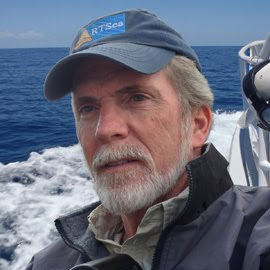 To the many people who watched or read of the ocean exploits of Jacques-Yves Cousteau, a visible icon of that era was the research vessel Calypso. I know it's white outline, punctuated by scientific toys like the distinctive yellow submarine "saucer," was burned into my memory. I built the Revell model kit, supported the Cousteau Society's occasional efforts at refurbishing it, and watched with sadness as it was eventually eclipsed by its high-tech replacement, the Alcyone. Ultimately, it sat rusting away in a French dry dock after having been rammed and sunk by a barge in Singapore in 1996.
To the many people who watched or read of the ocean exploits of Jacques-Yves Cousteau, a visible icon of that era was the research vessel Calypso. I know it's white outline, punctuated by scientific toys like the distinctive yellow submarine "saucer," was burned into my memory. I built the Revell model kit, supported the Cousteau Society's occasional efforts at refurbishing it, and watched with sadness as it was eventually eclipsed by its high-tech replacement, the Alcyone. Ultimately, it sat rusting away in a French dry dock after having been rammed and sunk by a barge in Singapore in 1996.However, according to British news reports in the Independent and BBC News, efforts are underway to resurrect the famed ship, making it once again seaworthy as a touring educational exhibition. Cousteau's widow from a second marriage is involved in the effort and would like the French government to declare the Calypso as part of France's national heritage, making it eligible for
 public restoration funds. But getting the Calypso, a converted minesweeper, to once again ply the waves will be no small feat, as the years of abuse and neglect have definitely taken their toll.
public restoration funds. But getting the Calypso, a converted minesweeper, to once again ply the waves will be no small feat, as the years of abuse and neglect have definitely taken their toll.According to long-time crew member Albert Falco, "Everything which is not rusted is rotten and everything which is not rotten is rusted."
Unfortunately, various controversies have dogged the Calypso and the Cousteau family regarding ownership since Jacques-Yves Cousteau's death in 1997. Hopefully, the passage of time has healed some of those wounds and as we enter the centennial of Cousteau's birth, we can look back on the legacy of his work and how it fired our fascination in the undersea world. Oceanographic science undoubtedly received a public relations boost that helped support further research which built on and refined some of the studies and observations made aboard the Calypso.
Whether that famed vessel can once again make its own wake upon the open sea remains to be seen. But what it has meant to many ocean conservationists - professional or armchair - would seem to justify not seeing the Calypso become a distant memory.
Read the BBC News article.
Read the Independent article.

















No comments:
Post a Comment